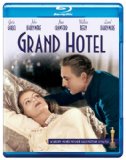| Reviews & Columns |
|
Reviews DVD TV on DVD Blu-ray 4K UHD International DVDs In Theaters Reviews by Studio Video Games Features Collector Series DVDs Easter Egg Database Interviews DVD Talk Radio Feature Articles Columns Anime Talk DVD Savant Horror DVDs The M.O.D. Squad Art House HD Talk Silent DVD
|
DVD Talk Forum |
|
|
| Resources |
|
DVD Price Search Customer Service #'s RCE Info Links |
|
Columns
|
|
|
Grand Hotel
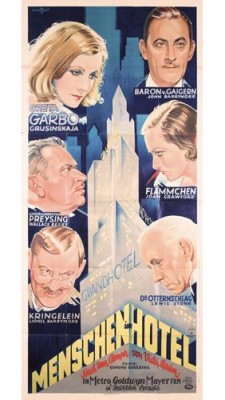
Nineteen thirty-two was a great year for Continental Europe...in Hollywood. Paramount had at least one timeless classic on its hands with German émigré Ernst Lubitsch's sophisticated, brilliant romance/sex comedy Trouble in Paradise, with its marvelously artificial matte views of "Venice" and "Paris" visible from the windows of its gorgeously studio-created interiors; in the meantime, over at Metro-Goldwyn-Mayer, producer Irving Thalberg was parlaying the smash-hit, Berlin-set Broadway play (itself backed by the studio for just this purpose) Grand Hotel into a star-studded picture with a glossier brand of Continental charm that would play no small part in cementing the reputation of Mr. Mayers's dream factory as the one that, of all the majors, put the most luxe, extravagant pictures onto the big screen. Trouble in Paradise, gently kissed with the famous Lubitsch touch, is undoubtedly the more interesting and distinguished film, but Grand Hotel, with lush, glamorous cosmopolitanism throbbing in its veins and manifesting at every level (in the film's worldly tone, in its discreetly expensive décor and costumes, in the stars from Europe, Britain, and America) is the motion-picture embodiment of what makes anyone nostalgic for "old Hollywood," and not just for sparkling constellations of beautiful, well-spoken movie stars shining from the silver screen, surrounded by sumptuous settings and always dressed for the occasion. Just as importantly, Grand Hotel exemplifies the high level of quality assurance to which Hollywood's golden-era assembly line sought to live up; there's a refined and clever sensibility in its writing, a verve and bite to its performances, and a bold, enthusiastic visual brio that soars far above and beyond what's merely necessary, joyfully exploiting all the opportunities allowed by the movie camera and copious studio resources to create an exhilarating sense of style that saturates every expertly-lit black-and-white frame.
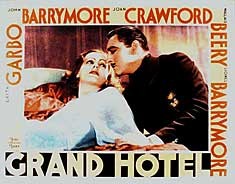
That stylishness isn't quite the individual signature that can be matched up to the exquisitely-realized idiosyncrasies in sensibility that make Trouble in Paradise An Ernst Lubitsch Film; here, the director is less the "author" than the well-seasoned ringleader capable of dealing with what comes up and making everything respond harmoniously to the material. For that job, future Dark Victory director Edmund Goulding (who, like his analogue, Casablanca director Michael Curtiz, was a consummate, highly experienced professional from way back in the silent era who'd worked on all sorts of movies) was the perfect, seasoned cinematic jack-of-all-trades who could be counted upon to marshal the film's various parts into something well-combined and whole, and who would bring a sensitive, involved, supreme craftsman's eye and ear to the proceedings. It's a way of cooking up a worthy, high-quality production that would serve the studios well in the subsequent couple of decades, now regarded as Hollywood's Golden Age: Gather and mix the most select, top-shelf ingredients from the studio's well-stocked pantry of technical and performing talent, with an eye toward what would be most complementary for the menu at hand. In Grand Hotel's case, it was prodigious producer-extraordinaire Thalberg playing master chef, starting off with a strong dramatic base in the form of William Drake and Bela Balazs's adaptation of a popular novel by Vicki Baum, then folding in the highly gifted Goulding, ace art director Cedric Gibbons (whose mile-long résumé would also include Ninotchka and The Wizard of Oz), photography by William Daniels (Ninotchka as well, and Jules Dassin's D.P. on Brute Force and The Naked City), and adding as top notes a generous sprinkling of handpicked stars, from on-the-rise movie queens Joan Crawford and Greta Garbo to Wallace Beery (fresh off his Best Actor win for The Champ) to two stage-legend Barrymores, Lionel and younger brother John. With MGM's excesses of top-notch facilities, creative personnel, and crew at his production's disposal, Thalberg, Goulding, and the rest whipped it all together and served up one of Hollywood's most successful confections ever.
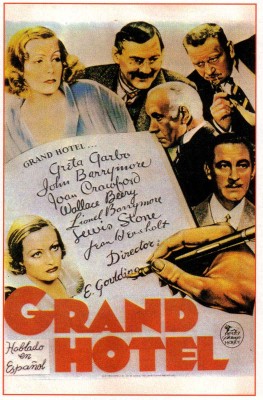
It's not just its commercial and critical success at the time (it was hugely profitable and won the 1932 Best Picture Oscar), however, but its wide array of enduring merits as a motion picture that makes Grand Hotel one for the ages. The film would have been a fancy-looking bauble and exponent of high-life Depression-era escapism one way or another, but it doesn't settle or coast on its most instantaneously conspicuous charms; there's an artistic ambition in it, too, that's very nicely weathered the test of time. Goulding orchestrates what are, indeed, eye-poppingly high production values and swoon-worthy stars, costumes, lighting, and very advanced sound (in the very early talkie years) in such a way that the symphony of emotions waiting to be conjured from the story's human drama becomes part and parcel of the elegant images he and his team emblazon upon the screen. At the moment Goulding's dexterously mobile camera has found its way inside, the Grand Hotel in Berlin houses quite a diverse little cross-section of guests within its chic deco environs. Before we get to them, though, we are introduced to the framers of the action, in the form of a busy front-desk manager (Jean Hersholt), who dutifully kowtows to the guests even though a wife in a maternity ward somewhere by far supercedes them in his cares, and a distinguished, wizened intellectual, World War I veteran, and permanent hotel resident (Lewis Stone), whose half-burnt face from the war is a mark of well-earned world-weariness. To this latter character is given the famous "People come. People go. Nothing happens here," and in a sense, on the life-or-death terms with which he's all too familiar, he's right; these Greek chorus-like figures on the periphery of the goings-on, one rightly preoccupied with elemental matters of family and childbirth, the other justifiably big-picture philosophical, put the bustling, urgent dramas of the other characters into perspective, giving the film a certain subtlety while lightening its load of anything too potentially traumatic, existentially speaking.
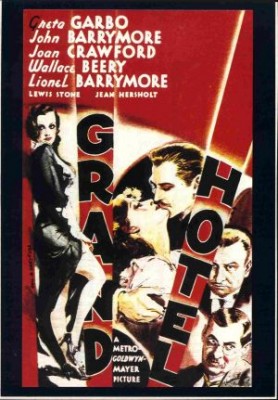
Not that Goulding and co. let us remain so immune to the urgency of what transpires between the guests served by and gnomically counseled and commented upon by the fatalistic veteran. Each of the film's principal personages is torn between love and idealism on one hand and pragmatism or ambition on the other. A penniless Baron (John Barrymore), installed in the hotel by a gang of thieves, falls in love with the prima ballerina (Greta Garbo, of course) whose pearls he's meant to snatch; the dancer, ennui-ridden and disillusioned with her art, famously "just wants to be alone." The Baron passes conscience-stricken time flirting with a plucky stenographer (Joan Crawford, in perhaps her most early-career role) who's been summoned to an adjacent room by a staid, punctiliously bourgeois family man (Wallace Beery), in Berlin to negotiate a fraught business deal, whose precarious slide toward expedient unethicality in his business dealings may have an echo in a wandering eye toward the young, flapper-figured typist, who's as in love with the Baron as he is in love with the dancer. Meanwhile, one of this stern, morally fragile businessman's small-time wage slaves, a sweet-natured clerk (Lionel Barrymore) whose doctor has given him a death-sentence diagnosis, means to live it up in luxury during his short remaining time, endearing himself in the process to everyone but his imperious, penny-pinching boss, whom he can finally tell off with impunity. If dramatic conflicts pull most all of Grand Hotel's characters between idealism and more prosaic money/job/property worries -- in an environment whose apparently effortless, leisurely affluence only throws their longing to belong to or remain in such a carefree milieu into sharper relief -- make the hotel a pressure cooker on the narrative level, then Goulding's and Davis's unemphatic but persistent, marvelously executed lateral pans, punctuated by glimpses of the revolving-door front entrance and near-abstract, extreme-high-angle compositions that take in the hotel's entire interior and underscore its circular design, make it seem a merry-go-round that, like life itself, will keep on spinning, no matter who checks in or out, or why, or when. (Though the French master's films exist in an entirely other, much more individually artistic universe far away from Hollywood's dream factory, this generous but resigned approach to its people gives Grand Hotel an unexpected resemblance, if only in spirit, to Jean Renoir's roughly contemporaneous, complicatedly humanistic films, especially The Rules of the Game, with its similarly high-class setting for thwarted loves, disappointments, and haunted consciences.)
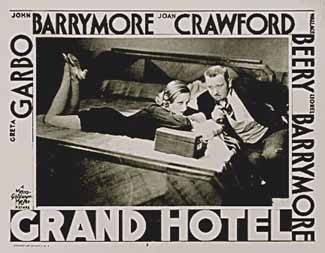
But then, too, there are the silver-screen thrills, the sheer glamor, all those fantastically-lit close-ups, and the heightened-reality, movie-dream romance of impossible loves amid splendid settings, which all offer a whole other, more simple and immediate kind of pleasure. (The way Garbo is lit and framed here, for example, is iconic in a way that floats free of the film; it's certainly the first image of that eternally mystified star that springs most immediately to mind.) What makes the film's disparate elements of dramatized, near-fatalistic empathy -- the acceptance of happy endings not being guaranteed, and that some compromise, some failure, is inevitable, so we needn't judge too harshly -- and celestial, chiffon-cigarettes-cocktails ostentation (the opening sequence actually features each actor's credit accompanied by an accompanying picture against a graphical burst of stars) gel so very well, so that no cracks show and the whole delightful affair seems of a piece, is simply the confluence of talent on hand, the expert intuition, both behind and in front of the camera, for what will make a moment, an interaction, an emotion, a realization, a theme, or a shift in tone work both visually and dramatically, so that the film exists comfortably and surefootedly, with "natural" and convincing ease, on each of its several, seemingly contradictory planes. Grand Hotel is a polished production, to be sure, and it indulges fully in high Hollywood artifice, turning our head that way with ease...but all while succeeding on a lower-key, bittersweetly observed, more human scale, too. Its characters may be faced with one-or-the-other choices between their dreamed ideals and more pressing, mundane realities, but Grand Hotel is a movie that manages to have it all.
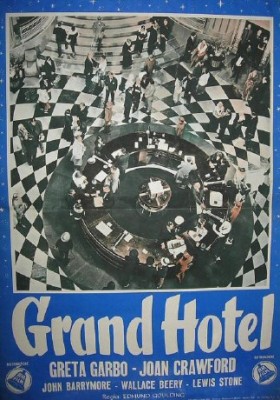
THE BLU-RAY DISC:
The transfer of Grand Hotel -- AVC/MPEG4, 1080/24p -- is absolutely luminous, really as perfect as could be hoped for. It seems almost impossible that such an aged film could look so close to pristine, without an overzealous digital noise reduction cleanup job that would have stripped the film of its celluloid texture and grain (which is vividly present here) but without a trace of scratching, wearing, debris/dirt, or the other typical signs of age (the relative softness of the image is, to this viewer's eye, not a flaw but entirely due to the era's film technologies and aesthetics -- a faithful rendering of the source materials, from a time when films were not across-the-board dedicated to deep-focus sharpness). Blacks, lights, and the variations and contrasts between all look fantastically solid and vivid as appropriate, and there is not a single instance of edge enhancement, aliasing, or any other compression artifact. It has fairly close competition, in terms of extremely high picture quality, from UK distributor Masters of Cinema's Blu-ray edition of the 1935 Ruggles of Red Gap, but this might just be the very best transfer of a film this old that I've ever seen.
Sound:There is some light hiss in the far background throughout (as somewhat normal for such an early talkie), but the DTS-HD Master Audio 1.0 mono track would seem to have done the very best, most faithful job possible of reproducing the film's original sound; everything is nicely audible and level, and any tinniness or blare one might hear in, for example, a scene of loud music is strictly due to the audio technical limitations of the time, not the mastering for disc that has been done for this release. In all, it sounds just as it should, as well cleaned up as possible, and offers a faithful conveyance of the film's sonic dimension that's quite enjoyably listenable.
Extras:A new supplement created exclusively for this new Blu-ray release is a feature-length audio commentary with Jeffrey B. Vance, an expert on earlier Hollywood (he's also provided commentary for Chaplin's The Gold Rush and Milestone's Mary Pickford collection), here accompanied by Garbo expert/author Mark Vieira. Throughout, the two draw upon their deep wells of knowledge about the film's production history and reception, including plenty of anecdotes from the set, while placing it in its context as an innovative picture, both in its handy use of then-new sound technology and as the first Hollywood film with a star ensemble cast, a 180-degree opposite strategy (the rule then was ONE star per picture, in order to spread them around and create a higher quantity of profitable films) devised during a sharp downturn in cinema attendance to bring in Depression-era moviegoers with the promise of more stars for their buck.
Otherwise, all of the extras from Warners' 2004 DVD release of Grand Hotel have been grandfathered in, including:
--"Checking Out: Grand Hotel," a 12-minute short, apparently created in 2004 for Turner Classic Movies, in which a breathless narrator gives us the rundown of the film's entire production history, from popular novel to popular stage play to casting to shooting to premiere, all illustrated with stock footage, scenes from the film, and clips from the next bonus feature, "Hollywood Premiere of Metro-Goldwyn-Mayer's Grand Hotel," (10 min.), a newsreel devoted to the red-carpet, star-studded first showing of the film, with stars (including those not in the film, like Edward G. Robinson) and famous spouses and even Mr. Mayer himself "checking in" to sign the guestbook and make comments for the camera.
--Nothing Ever Happens (18 min.), a 1933 Vitaphone short that succinctly and affectionately parodies Grand Hotel (Faemmschen, Crawford's character, becomes "Scramchen," etc.). It's sharply amusing, it's musical, it has rhyming dialogue, and (warning) it only makes sense after you've seen the film.
--Two trailers, one for a re-release of Grand Hotel, and one for its 1945 remake, Weekend at the Waldorf, starring Lana Turner and Ginger Rogers.
--"Just a Word of Warning," (1 min.), a sort of anti-teaser shown at Grauman's Chinese Theatre to "warn" patrons that Grand Hotel was leaving in only weeks and "would not be shown again in L.A. or county this season."
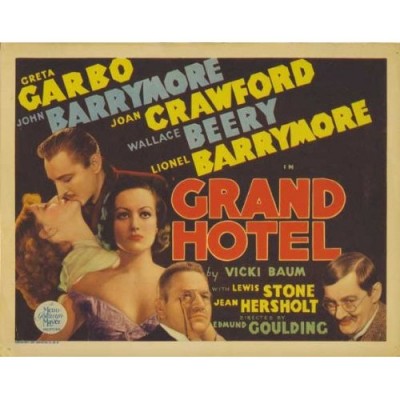
Grand Hotel is one of those perfect Hollywood studio-era gems in which all of the ingredients -- director, script, settings/costumes/camerawork, and stars (oh, does it ever have stars, every one of whom earns our fascination) -- are perfectly blended. It's a hallmark of well-crafted, elegant, and lively cinematic storytelling, with the story itself affording us a well-mixed roundalay of intriguing, complicated, sympathetic but never merely saintly characters -- a struggling stenographer, a financially destitute aristocrat flirting with crime, a tortured-artist ballerina bereft of inspiration, a businessman in crisis, and a dying wage slave determined to enjoy the rest of his time on earth -- who go in and out of each other's lives in much the same way the guests enter and leave through the ever-revolving doors of the luxury Continental hotel of the title. It's a sumptuous setting (exploited with always adroit, often very beautiful visual aplomb by the film's director, the inspired Hollywood craftsman/jack-of-all-trades Edmund Goulding (Dark Victory)) in which the guests' ambitions, fears, and hopes intersect; we witness them flirting with, crossing and confronting, and falling in love and lust with each other, while at the same time contending with the most practical matters of money and jobs, each of them facing a moral, ethical, or romantic conundrum whose evolutions and resolutions (or lack thereof) strike impressively varied, unexpected chords that, in the end, make for a surprising emotional resonance. As orchestrated by Goulding's capable hands, Grand Hotel becomes a gracefully achieved, visually gratifying, dramatically supple triumph, a luminous big-screen indulgence in decadent, always at least faintly erotic luxury that nevertheless looks with a wise, sympathetic eye upon its not quite "realistic" yet recognizably human ensemble of characters, attaining some serious dramatic tensions and payoffs through their crossing paths. In short, it's one of the finest exemplars of classical Hollywood's glorious studio-system marriage of star power and lush production values to strong, refined writing, disciplined and perfected technical skill, and bottomlessly resourceful aesthetic energy -- a supreme, sophisticated entertainment that is at once an astute, thoughtful, sometimes quite moving drama and a ravishing, impossibly glamorous Hollywood spectacle. Highly Recommended.
|
| Popular Reviews |
| Sponsored Links |
|
|
| Sponsored Links |
|
|
| Release List | Reviews | Shop | Newsletter | Forum | DVD Giveaways | Blu-Ray | Advertise |
|
Copyright 2024 DVDTalk.com All Rights Reserved. Legal Info, Privacy Policy, Terms of Use,
Manage Preferences,
Your Privacy Choices | |||||||









